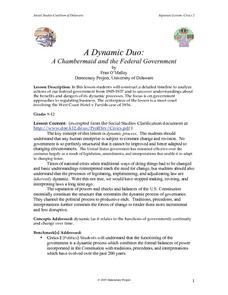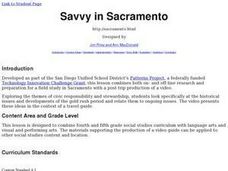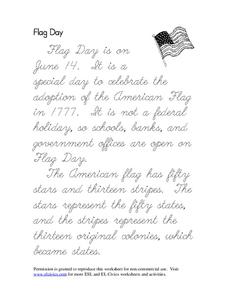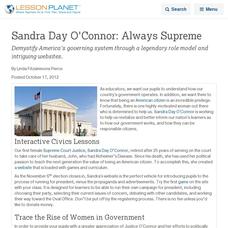Curated OER
The Revolving Door: U.S. Immigration
Learners compare current cultural perceptions of the immigrant experience with ones of the past. They will relate current immigration stories as seen in the PBS documentary "The New Americans" to those of the historical past.
Curated OER
Problem in Inarqi
Students practice identifying and solving problems. They assume a role to solve an authentic problem. During the simulation, students explain the structure of the government and reasons for adopting that particular structure. They...
Curated OER
A Dynamic Duo
Students engage in the research of history that surrounded the actions of the federal government during the years from 1907-1937. The focus of the lesson is upon the regulations imposed on business during the time and how it effected the...
Curated OER
Comparing Time Periods in U.S. History: The Ashford Project
Fifth graders use a "fact book" comparing periods in American history then students create a picture to illustrate their assigned periods. # # students use their pictures and concept maps to write expository paragraphs about their...
Curated OER
Investigation of the Warren Court
Students study period of Supreme Court history when Earl Warren was the Chief Justice and how the cases of this era effected American society.
Curated OER
Anne Frank: Interviews
Pupils conduct an interview with a person who was alive during WWII. They explore the media coverage of human rights abuses and speculate about what American knew and when regarding the Holocaust. They prepare a commentary with their...
Curated OER
Savvy in Sacramento
Students take a field trip to the state capital, Sacramento. Using the Internet, they explain the physical and human geographic features of the area and discuss interactions between the people of California between the time of explorers...
Curated OER
The Living Weapon
Students explore American history, military strategy and scientific discovery near the end of the World War II era. They examine the principles of the Cold War, pacifism, and the desire to keep government programs secret from the...
Curated OER
Lesson Plan: Bringing Out the Vote
Students explore voter turnout, analyzing why Americans don't vote, and citizen activism through creating community publicity about the 2004 Presidential election.
Curated OER
Flag Day
In this printing practice worksheet, learners trace over the words, which are written in dotted-lines, of 2 paragraphs about Flag Day. The writing is in cursive and there is a picture of an American flag on the page.
Curated OER
William Howard Taft National Historical Site
Students examine the role William Howard Taft played in American History. They analyze his background and how he got to be president. They compare qualities of leaders today to Taft.
Curated OER
Tell About South II: Poets and Prophets
Students explore the life of Richard Wright. They create a Power Point presentation to showcase Wright's journey from Mississippi to Memphis, Chicago, New York, and France and how he was an example of an African-American who moved north....
Curated OER
Publisher Skills Assessment
Young scholars complete a technology integration project using Publisher. In this technology lesson, students use Publisher to create magazine activities for the American Revolution, indigenous cultures, California missions,...
State Bar of Texas
Brown v. Board of Education
You walk each day over 20 blocks to school as a 9-year old because the color of your skin does not allow you to attend a school in your own neighborhood. Scholars use the 1954 Supreme Court case Brown v. Board of Education to investigate...
State Bar of Texas
Plessy v. Ferguson
Where did separate but equal originate and what does it mean? Scholars investigate the Supreme Court Case Plessy v. Ferguson. Using a short video clip, they analyze the impact the decision of legal segregation had on society in 1896....
State Bar of Texas
Sweatt v. Painter
Is separate but equal actually equal? The 1950 Supreme Court case Sweatt v. Painter discusses the law of segregation and inequality. Scholars investigate the impact of the case on the desegregation of public schools across the nation...
State Bar of Texas
Wisconsin v. Yoder
How far does freedom of religion truly go? The 1972 Supreme Court case Wisconsin v. Yoder introduces the concept of the free exercise clause of the First Amendment. Individuals examine the case with a short video and open discussion. To...
State Bar of Texas
Mendez v. Westminster and Delgado v. Bastrop ISD
You arrive at school only to be told you have no place there. Scholars research the Supreme Court cases Mendez v. Westminster and Delgado v. Bastrop ISD, both dealing with school segregation. Two short video clips as well as small group...
Center for Civic Education
Constitution Day Rap
Engage your class while learning about the US Constitution with this fun primary grade social studies lesson. After viewing a picture of the US Constitution, young learners piece together a US flag using stars and...
Center for Civic Education
To Amend or Not to Amend, That's Been the Question...Many Times
Looking for some ideas for how to celebrate September 17, Constitution Day? Check out a packet that focuses on the factors that are considered in the amendment process. Class members examine the amendment process and the types of...
Curated OER
Sandra Day O'Connor: Always Supreme
Demystify America's governing system through a legendary role model and a fabulous website.
State Bar of Texas
Schenck v. US
Freedom of speech is absolute—or is it? The Supreme Court case Schenck v. United States has learners research what free speech really looks like. A short video along with paired work creates open discussion and thought on what speech is...
State Bar of Texas
Hernandez v. Texas
What if the jury is not made up of people from your ethnicity or background—are they still considered your peers? Scholars analyze the impact the Supreme Court case Hernandez v. Texas had on jury selection across the nation. Paired...
State Bar of Texas
Tinker v. Des Moines
Freedom of speech allows anyone, even those in school, to say and do what they feel—right? The 1969 Supreme Court case Tinker v. Des Moines serves as the backdrop for a study on First Amendment rights. Scholars use a short video along...
Other popular searches
- U.s. American Civics
- Us American Civics
- Chapter 1 American Civics
- Holt American Civics
- American Civics and Activism
- Chapter 2 American Civics
- Civics American Goverment























